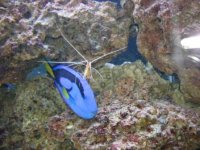mling":32yzgvzu said:
Looks like my Hippo Blue Tang has Ick. I have had it for over a month now. It is behaving normally, eating everything that is can find. It is also very active, which would make it difficult to catch and place in a hospital tank. I understand that ick is usually due to the immune system of a fish being low due to stress, etc. I am sure it is the etc in my case.
I know that Blue Tang are notorious for getting ick. What is the best approach to treating it ? Last time I had ick on a Scopas Tang, it was sick enough for me to catch and put in a hospital tank. There is lowered the SG till almost fresh water, i.e. hypo dip, after a few days that did the trick.
Do I have no choice but to wait for the ick to make this Hippo weak enough for me to catch and treat in a hospital tank ?
Will be be contagious to the other fish ?
Water parameters are all great enough for corals to be thriving.
first off, be sure it's indeed ich before you panic, and then don't panic...
there's another parasite that will cause very teeny white 'zits'-usually around the forehead area first-they're quite small-the head of the 'zit' looks ALOT like ich-it might be a fluke, i'm not sure-but it responds well to fw dips w/ or w/out an adiitive like praziquantel
leaving any fish to get weak enough to get that sluggish by something as quickly lethel as ich ain't right-you can't move some rocks and deal w/a 2 hr pita to save a hippo from one of the most easily treatable diseases, but would rather let it slowly suffocate? pardon me, but i don't see the benefit in that to anyone, nor can i understand how that can be reconciled with a request for 'best treatment' :?
i've seen and kept (under a very watchful and practiced eye) hippos that developed very mild ich (isolated spots, mebbe 1/2 dozen or less) multiple times a year, for a day or so-other than that they were always phat and sassy
to judge and balance the 'severity' of an ich outbreak, look at the other indic
ators-fish are telling you how they feel every second you watch them

fin deportment-are they closed/clamped down tight, taught/fully extended, or lazily half-open ?
breathing rate-is the fish huffing, gasping, yawning alot, holding one set/side of gills 'flared' open etc etc? if you watch a few tanks at any lfs, you'll see that most fish we keep breath similarly-a very short pause between gill flapping-the gill plate rests closed for just an instant, in rapid breathers, while groupers/lions actually get to full pause-just like us when we're relaxed-we often pause between the end of the exhale and the next inhale
is it eating ? fish will almost eat themselves to bursting, if allowed-appetite decreases as health decreases-just like us

if the fish holds its fins clamped/constantly closed, breathes rapidly, and is disinterested in food, you will lose that fish if it's indeed ich, has gotten to that stage by the time you decide to treat it, especially a tang that needs multiple feedings a day to stay healthy, unless you're a very practiced dipper (you may need to do multiple dips, and need to maximize dip time using the fish's relative distress to the dip as the determiner for time of the dip
you can't kill the cysts on the fish's body-any treatment to be 100% eradicative must be done for the entire life cycle time of the parasite,and assumes none in the housing tank to begin with (no such tank on the planet

)
hypo is 100% effective in eradicating the parasie on the fish-should be done for a month, and the fish MUST be acclimated back to normal ocean value sg SLOWLY-it's possible to drop a fish to hypo in a matter of hours, at minimal stress levels.
bringing it back up should be done over a period of days
hth






